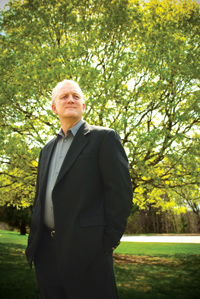2009 Visionaries
 The role of leadership in business is indisputable. In the highly competitive consumer goods (CG) industry, the challenging task to drive differentiation ultimately rests in the hands of a company's most talented and dedicated members, especially during turbulent financial times. For six years now, CGT has saluted "visionary" CG executives that are shaping the future of their respective companies by leading unprecedented business process and technology initiatives. Starting with E. Jeffrey Hutchinson, CIO- NA for Danone/Dannon, our Visionaries list is a who's who of influential industry leaders. All will undoubtedly inspire you to pursue positive change within your organization.
The role of leadership in business is indisputable. In the highly competitive consumer goods (CG) industry, the challenging task to drive differentiation ultimately rests in the hands of a company's most talented and dedicated members, especially during turbulent financial times. For six years now, CGT has saluted "visionary" CG executives that are shaping the future of their respective companies by leading unprecedented business process and technology initiatives. Starting with E. Jeffrey Hutchinson, CIO- NA for Danone/Dannon, our Visionaries list is a who's who of influential industry leaders. All will undoubtedly inspire you to pursue positive change within your organization.
E. JEFFREY HUTCHINSON
Chief Information Officer -- NA
Danone/Dannon
Jeff Hutchinson is a firm believer in the philosophy that the only thing that doesn't change is change itself. Formerly a partner with Accenture and now the current North American chief information officer for the 15 billion euro manufacturer Danone, the maker of Dannon yogurt and other food and beverage products, Hutchinson has spent the majority of his 30-year career enhancing businesses through process improvements, packaged application implementations, and effective program and project management. In line with his philosophy on change, he believes that the value obtained from these initiatives will diminish if you apply the same approaches time and time again.
"As business leaders, we need to understand how we arrived at where we are today, and we need to keep a clear eye on the future," says Hutchinson. "We need to think outside of the box. We need to ask: How can we fundamentally change the way we do business? Change our DNA? Change our culture?"
The answer to all of these questions, in Hutchinson's experienced opinion, is to leverage emerging technologies, an area of focus that he and others have been refining for Danone over the last three years.
"I believe there are numerous emerging technologies that will play influential roles in our future," he says. "The trick is trying to determine which ones to adopt."
Vision in Action: According to Hutchinson, Danone leadership will provide the funding, openness, support and freedom to make a sound idea happen. In April 2008, Danone launched a global program to unify its communication and collaboration efforts through the use of emerging technologies. Internally coined "DAN 2.0," the program's objectives include improving productivity and efficiency, reducing travel expenses and decreasing the company's carbon footprint.
"If Web 1.0 was about connecting computers and making technology more efficient for those computers, then Web 2.0 is about connecting people and making technology more efficient for the users. This is what DAN 2.0 is all about," he says.
Hutchinson and his team -- which includes local managers and directors backed by a central IS/IT team in Paris -- are currently focused on communication improvements delivered through voice and video conferencing capabilities, including instant messaging, collaborative Web meetings and community designed Web sites (wikis).
High definition video conferencing has already dramatically reduced the number of international and domestic travel trips taken by Danone employees and has positively impacted sustainability efforts by reducing the travel component of its carbon footprint. Another pro: Hutchinson says that video conferencing has undoubtedly improved the work/life balancing act for employees, allowing for more time with family.
Future Endeavors: With solid gains being made on the unified communications front, Danone is turning its attention to enhancing collaboration capabilities through internal social networking sites, search offerings and information sharing capabilities. "For these areas, the challenge is not the technology offering, but the cultural change needed to enable its initial and continuous usage," admits Hutchinson.
This is where generational differences in the workforce and their influence on communications, behaviors and attitudes come into play. While social networking sites are generally embraced by Generations X and Y (millennials), veterans and baby boomers need to learn how to leverage these capabilities.
"While I can appreciate that acceptance and adoption of new technologies can be a longer process for some groups, I feel the need to balance this with the business need of maintaining a competitive posture to ensure market share stability and growth," says Hutchinson.
In North America, to help promote change management, Danone has leveraged "change patterns" to introduce new ideas and conducted virtual and in-person workshops based on the book "Fearless Change" by Mary Lynn Manns, Ph. D, and Linda Rising Ph. D.
Employing an agile project management methodology has also proven to be very successful in this area, especially since emerging technologies by their very nature are immature and the end state is unknown. This methodology, leveraged at Danone North America and using the expertise of PACE University's Seidenberg School of Computer Science and Information Systems, is designed to provide a continuous feedback loop between employees and the IS/IT developers, which does not rely on a comprehensive list of requirements at the start of a project. According to Hutchinson, "This approach has resulted in the ongoing delivery of valued functionality without wasting resources."
Words of Wisdom: The area of emerging technologies, along with the appropriate cultural change, has been key to enhancing Danone's communication and collaboration capabilities both inside the enterprise and with its trading partners. When asked what advice he would give to companies looking to tackle a similar project, Hutchinson offers a familiar saying: "'Just Do It' -- you may purchase the wrong equipment, and yes, you will even make some mistakes. And no, you will not completely know what the end game will look like. But you need to get moving to find out."
 STAN LECH
STAN LECHVice President, R&D, Global Innovation & World-Wide Product Development
GlaxoSmithKline Consumer Healthcare
Vision in Action: GlaxoSmithKline Consumer Healthcare, a division of GlaxoSmithKline, is reinventing its approach to innovation and achieving impressive results. At the forefront of this initiative, Stan Lech designed and implemented a global open innovation model for the Consumer Healthcare division, which rapidly and effectively sourced high-value ideas, technologies and ready-made products to help drive growth for its lead market as well as its global brands. "Now well embedded into our corporate culture, this model has driven collaborative and entrepreneurial behaviors within R&D," says Lech.
As a result of this platform, more than 50 percent of products within the pipeline contain significant elements of external technologies and innovation. Products containing external elements average 1.8 times greater sales value and help to double the pipeline value for projects to be launched in 2008 through 2011.
Future Endeavors: Lech is currently leading an effort to develop a higher-performing and more cost-effective R&D innovation model, designed to deliver greater project capacity, increased speed to market and near infinite development capability. "To be most effective, the model requires early robust decision processes to determine the correct deployment of internal resources and capabilities, use of external third-party developers and strategic partnerships," he explains. The model is also expected to reduce the risk of failure throughout development by leveraging principles of "Quality by Design" and includes a proprietary process to ensure intellectual property coverage on all key innovations.
Who do you admire most in business? "I greatly admire Henry Ford's intense commitment to understanding the consumer and driving breakthrough innovation, which utilized high quality labor with lower cost processes. This, coupled with his boundless creativity on new business models, will make him a man admired for eternity," says Lech.
 KIMBERLY SENTER
KIMBERLY SENTER
Director of Category Management
Unilever US
Vision in Action: Kimberly Senter has dedicated much of her career to establishing Unilever as a leading force in category management in the United States. "In the last five years, we have focused our efforts and resources against building a world-class capability for our organization. This is made possible through training and developing talent, elevating our team's skill set, allocating significant resources to capability development, and making structural changes that enabled us to move more effectively from insights to action with our retail partners," explains Senter. "We are now seeing a return on our numerous investments through stronger strategic partnerships with retailers, reassuring us that we're on the right path."
Future Endeavors: According to Senter, Unilever will continue to enhance and leverage its category management tool kit to drive sustainable and profitable growth across its portfolio.
"Our current focus is on next-generation tools that will provide us with deeper insight into shopper behavior, which will facilitate the development of in-store solutions," reports Senter. "We've partnered with some outstanding suppliers in cross-category analytics and virtual technology to help develop leading-edge, in-store solutions that address emerging opportunities in merchandising, category/department/aisle adjacencies and total store design. This thought leadership is what our customers expect, given our vast food and personal care portfolio."
What is the biggest industry challenge in the next five years? "Continuing to be proactive versus reactive to the changes in the economy, environment, retail landscape and consumer/shopper needs. Market leadership will require a superior understanding of macro trends and the ability to build today that which will be required for success in the future," explains Senter.
 KEN JOHNSEN
KEN JOHNSEN
Senior Vice President and Chief Information Officer
PepsiAmericas Inc.
Vision in Action: What is Ken Johnsen's biggest win insofar as the senior vice president and chief information officer at PepsiAmericas? The first thing that comes to his mind is "earning a seat and voice at the table." Johnsen explains; "By that I mean building credibility, trust and respect for the IT organization, which has enabled us to become strategic partners." Johnsen and his IT team at PepsiAmericas are now respected business leaders that deliver results every day for the company. "When you focus on operational excellence and consistent day-to-day execution, good things happen. But I also told my team that to become strategic business partners, we must walk, talk and act like business people, not IT people. Know the business. Speak the language."
Future Endeavors: For now, Johnsen and his team are working on a global initiative called the Global Growth Platform, which involves driving business process consistency and standardization across the company's international and domestic organizations. Earlier this year, PepsiAmericas' European operations were divided into four divisions to help take advantage of operational efficiencies, enhance geographic reach and leverage a broader base of talent.
"Next up is deploying a common global business platform on SAP and an infrastructure that will allow us to drive operating efficiencies through business process standardization and leverage best practice solutions across all of our geographies, not to mention enable us to rapidly integrate new business acquisitions much easier," he adds.
What is your leadership philosophy? "A prerequisite to success in any organization is having a great team. I'm not necessarily talking about people with superior technical skills or a great resume, but people with integrity and a strong desire to win. People who want to make a difference and put the success of the team before their personal success -- those people succeed in business and in life," says Johnsen.
 MARK DAJANI
MARK DAJANI
Senior Vice President and Chief Information Officer
Kraft Foods Inc.
Vision in Action: Thanks to Mark Dajani and his team, Kraft Foods embarked on a multi-year journey to implement a targeted technology strategy that so far has significantly improved the productivity and user experience within the organization.
"Each of our information systems employees now recognize that their leadership, at every level, can transform the company," says Dajani. "We have seen our organization increase its accountability for the total business and its risk taking in providing leading-edge solutions."
Future Endeavors: "The efficiency and effectiveness of Kraft Foods is our highest priority," states Dajani. He elaborates that at the $42.2 billion packaged foods manufacturer, efficiency is defined by the continual optimization of business processes through automation, the elimination of redundancies as well as the leverage of scale through the implementation of shared services and external partnerships. Efficiency also rests in the productivity of Kraft Foods' 100,000 plus employees that help deliver its products to consumers in more than 150 countries. "Imagine the opportunities if technology effectively helps each of them save five minutes a day!" proclaims Dajani.
At the same time, the company's effectiveness is directly connected to its growth and how Kraft Foods connects with consumers and customers. "We have very exciting initiatives in this area that leverage the new digital economy," reveals Dajani.
What is your leadership philosophy? In Dajani's opinion, his leadership philosophy has evolved as his own professional development progressed at many organizations throughout his career. "At this point it's quite simple: People can lead from anywhere in the organization. You don't have to be at the top of the organization to make a big impact," he says.
 JENNIFER HUGHEY
JENNIFER HUGHEY
Vice President -- Supply Chain
Electrolux Home Care Products North America
Vision in Action: After almost two years of developing a business case and selling it to Electrolux Home Care Products' upper management in both the United States and Sweden, the efforts of Jennifer Hughey and her team finally paid off when they got the go ahead to invest in Logility Voyager Solutions, a demand and inventory planning system. "Now, after almost a year in operation, we have seen great results in eliminating manual processes, improving forecast accuracy and reducing inventory, to name just a few benefits," says Hughey, who also believes that the company has just begun to tap the capabilities that the new system has to offer. "We will continue to see benefits from this investment well into the future."
Future Endeavors: In these tough economic times, Hughey is focused solely on taking costs out of Electrolux Home Care Products' supply chain in North America. To reduce overall expenses and improve efficiencies, she plans to leverage the company's existing relationships with carriers as well as with employees. "When the economy slowed down toward the end of 2008, we were faced with very high inventory levels," says Hughey. "Therefore, it has been my focus to reduce days of supply while continuing to meet our trading partners' demand."
What is your leadership philosophy? "My leadership philosophy is to build a highly effective collaborative team by focusing on teamwork, encouraging everyone to think outside of the box and have fun while doing so. Anthony Robbins said it best: 'If you do what you've always done, you'll get what you've always gotten.' Therefore, I encourage my team every day to work together and look for ways to do things differently. With this kind of approach they help build and buy into the solution, which makes for a very effective and successful team," explains Hughey.
 DAN SULLIVAN
DAN SULLIVAN
Chief Financial and Operating Officer
Heineken USA
Vision in Action: Brewed since 1863, Heineken was the first imported beer to reach America's stores in the 1880s. Years later, and with a much larger portfolio of brands, Heineken has built a reputation for excellence -- both in the products it sells and in the manner in which it conducts business.
Dan Sullivan has had the good fortune of playing a large part in many strategic business initiatives for Heineken USA, including the seamless integration of the Scottish & Newcastle business into his organization. "As a result, I've been able to look at the business from many different perspectives and it has fundamentally shifted my ability to contribute within the company from a financial focus to a broad commercial viewpoint," says Sullivan. "That broader viewpoint has helped my team be more nimble and creative in the way they solve problems and created new career opportunities for all of us."
Future Endeavors: Sullivan believes that it is a time of incredible opportunity because of the huge shifts in the economy and its affects on the consumer. As a result, his work is centered around defining the strategic path for Heineken's portfolio and route-to-market while establishing the parameters of its long term business model. "At the same time, we have to be vigilant about how we manage our business in this environment. These two efforts have created an interesting mix of work that is urgently focused on the present and patiently focused on the future," he explains.
What is your leadership philosophy? "I believe that any organization's strength rests in its ability to find the best people, understand and develop their strengths, give them a clear vision of what you are trying to achieve and then get out of their way," reveals Sullivan.
 NILS MUELLER
NILS MUELLER
Global Business Services -- Supply Network Solutions, Global Program Manager
The Procter & Gamble Company
Vision in Action: Quite the feat, Nils Mueller has broken the record for the most nominated consumer goods visionary in six years running, thanks to his colleagues at The Procter & Gamble Company. Mueller led an effort to re-engineer the approach of the global implementation of a demand sensing application and has revolutionized the way that the company is able to forecast shipments using Demand Sensing from Terra Technology.
Not only has Mueller successfully managed this program, but he has also become an expert in this area of the business according to his colleagues, even collaborating with Terra Technology to continuously improve its offerings to Procter & Gamble as well as to
the consumer goods industry as a whole.
Future Endeavors: "In the current economic climate -- with ever increasing volatility in demand -- it is crucial to extend the supply chain visibility as close to our customers as possible," explains Mueller. In the near term, he is therefore now focusing on integrating customer demand data into Procter & Gamble's demand sensing application, which is expected to further improve forecast accuracy in order to achieve superior customer service.
What is the biggest industry challenge in the next five years? "Globalization, increased complexity and higher volatility in demand will require companies to drastically simplify their operations in order to be able to fully leverage their scale and increase agility. Speed today is of the essence," says Mueller. "Only those companies that can respond quickly to customer and consumer needs will stay ahead. At Procter & Gamble, one key focus area is on dramatically simplifying our operations. For technology professionals this is a major opportunity. We are well positioned to empower the company to turn external crisis into opportunity."
 AGNES FELICIANO
AGNES FELICIANOVice President of Customer Service
Kraft Foods Inc.
Vision in Action: For more than 25 years now, Agnes Feliciano has helped to ensure that Kraft Foods' supply chain successfully delivers high quality products despite company mergers, economic upheavals and changing consumer preferences. Today, she is responsible for the customer supply chain, fulfillment and development. Perhaps one of her greatest accomplishments has been leading the transformation of "Kraft Product Supply" from a functional organization into a customer-focused and business-aligned team.
According to Feliciano, "This team is driving profitable revenue growth through reliable customer service, shelf-driven demand management, and the effective utilization of internal and external operating assets, leveraging leading-edge technology and goal alignment across the company to fuel sustainable organizational
performance."
Future Endeavors: This year, Feliciano and her team are focused on turning its shelf-centered supply chain vision into a reality, working in concert with customers and business partners and operating as one supply chain from the shelf back.
"Collaboration platforms span across the value chain (demand signal integration, route-to-market, rapid replenishment, cooperative routing, etc.) to create an insulating advantage for Kraft Foods while delivering value to our customers and consumers," she says.
What is your leadership philosophy? "I grew up in a culture that's founded upon respect, trust and appreciation for every team member. These values and the passion to inspire every individual to realize their potential beyond the boundaries they have set for themselves underpin my leadership philosophy," explains Feliciano.
 JONATHAN MANLEY
JONATHAN MANLEY
Senior Vice President and Chief Information Officer
The Estee Lauder Companies
Vision in Action: The Estee Lauder Companies' Chairman Leonard A. Lauder is fond of saying, "The wealth of a company is its people. By that standard we are a very wealthy company." Senior Vice President and Chief Information Officer Jonathan Manley does not fall short of this saying, especially when it comes to operating seamlessly with an entire IT staff across the globe. Establishing a global IT community for The Estee Lauder Companies has been one of Manley's greatest accomplishments to date. Beforehand, and with more than 1,000 IT professionals in 35 countries, The Estee Lauder Companies lacked a way to communicate and operate as a virtual global team. "To do this, we now rely heavily on Microsoft Office Communicator, a tool that has accelerated the process of building teams, creating enduring working relationships and enabling us to share best practices," says Manley.
Future Endeavors: "One of our strategic goals is to create a more efficient and 'inter-dependent' company," Manley explains. "To that end, we are now extending the deployment of Microsoft Office Communicator globally to our employees so that they can
be connected, anytime, anyplace, anywhere."
Manley hopes that this implementation will enable increased global collaboration, reduced costs (especially in T&E), an improved work-life balance as well as improved productivity. Furthermore, Manley aims to achieve this level of efficiency while, at the same time, reducing The Estee Lauder Companies' impact on the environment, an initiative that is embedded into the company's culture.
What is your leadership philosophy? "I tell my colleagues that you can't learn unless you make mistakes -- only once -- which is why I like to give people the room to grow, perform and learn. I especially admire employees who are prepared to reach outside of their comfort zones and expand their personal performance boundaries," he concludes.
 TOM TORRALBAS
TOM TORRALBASDirector of Category Leadership
ConAgra Foods
Vision in Action: As the director of category leadership, Tom Torralbas oversaw the development and implementation of ConAgra Foods' Gold Store program for channels. Gold Store is a metric now used within the company to measure retailer performance against "category driving" retail conditions. "Channels are often overlooked due to data limitations and class-of-trade differences," says Torralbas. "However, we were able to build a scorecard around shelving and assortment, set meaningful objectives and complete implementation this past fiscal year." Gold Store performance has since been incorporated into the channels team's management performance metrics.
Future Endeavors: Torralbas understands that collaboration has become an imperative for winning at the shelf. That's why he has set his sights on leveraging insights automation to provide deeper, more meaningful insights to ConAgra sales teams and retail partners.
"ConAgra has a wealth of information sources, however, access is often slow and guarded due to limited resources from our data providers," says Torralbas. "We are leveraging sales automation platforms (such as Interactive Edge's XP3) to increase the access and visibility, which will allow ConAgra's category management team to leverage more meaningful insights as we further engage with our retailer partners and sales teams."
What is the biggest industry challenge in the next five years? "Retailers and manufacturers need to be positioned to react quickly to the shifting consumer needs. The ability to quickly identify macro consumer shifts, recognize the drivers, develop solutions and implement them efficiently is critical. This will undoubtedly separate the winners from the losers in consumer goods," says Torralbas. ConAgra's insights automation initiative is critical to meeting these objectives as it is expected to drastically improve its ability to quickly access, interpret and leverage insights to develop timely category management strategies.
 CHUCK NORSIGIAN
CHUCK NORSIGIAN
North American Chief Information Officer
Johnson & Johnson Consumer Companies Inc.
Vision in Action: Johnson & Johnson's credo was developed way before anyone heard of the term "corporate social responsibility." It states, "Put simply, our credo challenges us to put the needs and well-being of the people we serve first." Having the best people on board, like Chuck Norsigian, to carry on that credo gives Johnson & Johnson the reputation it has today. At the forefront of the entire North American IT team, Norsigian has seen the success of some major initiatives over the past year: "First, the acquisition of Pfizer Consumer Healthcare; next, the complete transformation of our supply chain, finance and procurement functions with SAP; and finally, the development of relationship and interactive marketing capabilities," he lists.
In the area of relationship and interactive marketing, Norsigian explains, "We have created an entirely new model in order to maximize the delivery of digitally-enabled, integrated marketing programs and developed entirely new business models. The successful launch of the best allergy product on the market, Zyrtec, and the creation of entirely new direct to consumer customized skin care offering, Skin ID.com, are two of the more than 30 examples of the work done by this team."
Future Endeavors: "Major focus will be placed on our two primary constituencies -- our customers and our loyal consumer base," says Norsigian. "We will continue leveraging our supply chain and sales investments to continuously improve customer service and profitability. For our consumers, we will continue our track record of providing superior products and services."
CLAY BROUSSARD
 Senior Manager, Customer Supply Chain
Senior Manager, Customer Supply Chain
PepsiCo
Vision in Action: Over the last two years, PepsiCo employeeshave worked hard to position the company as a leader in advocating moretransparency throughout the supply chain. This is a tactic that willundoubtedly prove its worth for the company as Demand Driven Supply Network(DDSN) practices continue to emerge within the consumer goods industry and asmore retailers share operational data with their suppliers.
PepsiCo's Senior Manager of Customer Supply Chain ClayBroussard is helping the $43.3 billion food and beverage manufacturer toharness this rich data in order to gain meaningful shopper insights as well asdrive real value with its retail trading partners.
"We are threading the consumer demand signal all theway through the last 100 yards of the supply chain to the shelf, andstrengthening PepsiCo's sense-and-respond capabilities in-market to betterserve and delight the shopper," he reports.
Future Endeavors: PepsiCo is currently implementing theinfrastructure and corresponding business processes to ensure that it is ableto leverage DDSN data across its entire enterprise.
"The DDSN journey will continue by fleshing out theright business intelligence solutions that utilize consumer demand data inorder to drive the most value to PepsiCo and our retail trading partners,"says Broussard.
What is the biggest industry challenge in the next fiveyears? "There are so many potential ways to benefit from the rich sourceof store-level, point-of-sale data. We must be strategic in our choices,"explains Broussard. "This will likely be determined through heavy internalcollaboration between sales, supply chain and operations teams, as well as withour valued customers."
RETAIL ALL STARS
Three thought leaders that are reshaping the retail industry
Patrick Byrne
Founder, Chairman and Chief Executive Officer, Overstock.com
Patrick Byrne is credited with creating a distinctive onlinebusiness. For the past eight years, Overstock has enjoyed steady sales growth.Its core retail segment involves purchasing closeout apparel, home and otherproducts in lots that are smaller than what typical brick-and mortaroff-pricers can handle. Since last year, Byrne says the average order climbedfrom $103 to $120 and repeat traffic is up. According to Byrne, the retailer'ssite will soon offer discount travel, auto buying and social components. Italso runs auctions and is expanding into Canada.
Shawn Dennis
Senior Vice President of Marketing, American Girl
American Girl, one of the world's leading toy companies, hasdevoted its entire business to celebrating the potential of girls ages 3 to 12.Leading its marketing efforts, Shawn Dennis has successfully managed to earnthe loyal following of millions of girls and the praise and trust of parentsand educators. Dennis has been extremely successful at mastering how to create"an emotional brand" across channels and creating brand advocacy withconsumers, which has helped deliver a year of growth despite the current retailslump.
Rosalee Hermens
Vice President and Chief Information Officer, Timberland
Timberland, best known for its trademark yellow work boots,has recently re-focused its technology infrastructure. Hermens, who joinedTimberland more than two years ago, has been implementing systems to bettertrack the complex enterprise including a data warehouse, business intelligenceplatform and middleware. "We are rebalancing our whole IT approach frombeing heavily focused on transaction processing to balancing that withintelligence and insight," says Hermens. "We are going full-forceinto business intelligence and becoming very data-driven."
For more information about these retail executives, read"2009 Influentials," published in the January 2009 issue of RIS News(www.risnews.com).

